Iran Appoints New Envoy In Afghanistan Following Controversial Spat
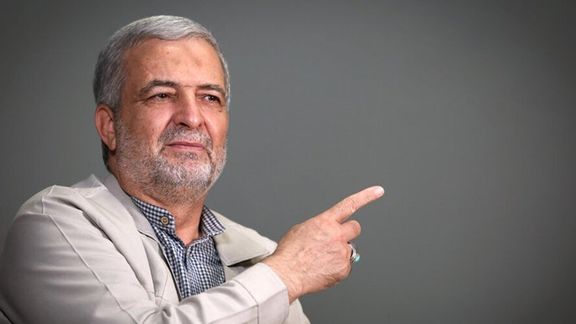
Iran has introduced its new ambassador to Kabul after the previous envoy’s comments regarding the Taliban raised eyebrows among the fundamentalist group.

Iran has introduced its new ambassador to Kabul after the previous envoy’s comments regarding the Taliban raised eyebrows among the fundamentalist group.
Tasnim website quoted Sunday Abbas Badrifar, a counselor at the Embassy of the Islamic Republic in Kabul, as saying that Hassan Kazemi Qomi, a known IRGC Quds Force operator, has replaced Bahador Aminian as the ambassador in Afghanistan.
Badrifar claimed Aminian’s term had come to end, but earlier reports said that Aminian was expelled after the disclosure of his comments against the Taliban following the hacking of the Fars news agency by a hacktivist group.
Last month, “Black Reward” group hacked internal documents of Fars News Agency, which is affiliated with the Revolutionary Guard, and published the full text of its findings on a Telegram channel.
Part of these files was the transcript of a speech by Bahador Aminian, the then-ambassador of the Islamic regime to Kabul.
Aminian himself had noted that if his comments would be published and be heard by the Taliban, he would not be able to return to Kabul.
Aminian, in the file, had described the Taliban as “a disaster for Afghanistan, the region and the world,” claiming that Tehran has no choice but to use this opportunity “to civilize them.”
However, Iran’s embassy in Kabul denied the statements and described it as a conspiracy to create crisis in the region.
Kazemi Qomi, who has now replaced Aminian, has been working as President Ebrahim Raisi's special representative in Afghanistan since the beginning of his term.
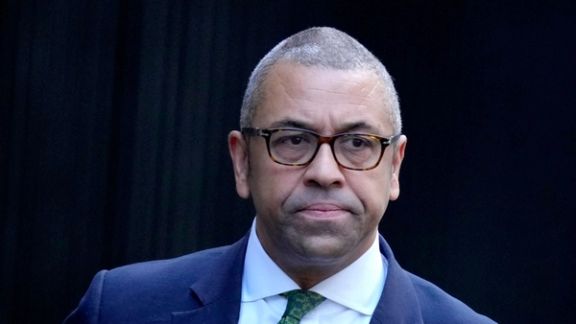
A British lawmaker, who chairs Labor Friends of Israel, has called on the UK government to expel Iran’s Chargé d’Affaires in London and to downgrade diplomatic ties with Tehran.
In a letter written to foreign secretary James Cleverly Thursday, Steve McCabe warned that current measures by the UK, US, and EU against the Islamic regime “are having little to no impact.”
Labor Friends of Israel also urged the government to take tougher action against the Islamic Republic because of the execution of two anti-government protesters.
Iran has executed Mohsen Shekari and Majidreza Rahnavard, both 23, on charges of injuring and killing security forces. They were detained during pro-democracy protests following the death of Mahsa Amini in mid-September.
McCabe slammed the execution warning that “many more” protesters are now in danger.
Further, he censured the regime’s “brutal and violent effort to suppress the legitimate protests” in which nearly 500 people – including 68 children – were killed by the security forces.
“We must now take urgent action – targeted at all those engaged in the perpetration of violence against the Iranian people – in order to both deter and punish the regime and to show our solidarity with the protesters,” he underlined.
“As usual, the regime is deploying torture and hasty trials to judicially murder those who oppose it and intimidate other protesters,” he suggested.

Iranians continue critizing both China and their own government for Beijing’s endorsement of a GCC claim over three Iranian islands in the Persian Gulf.
Politicians and pundits criticize their government for its over-reliance on China and Russia, nearly one week after the Gulf Cooperation Council met with Chinese President Xi Jinping and a joint statement was issued, which included a reference to the three islands, signaling Chinese support.
The government in Tehran in turn has voiced some mild criticism of China over the issue. It has said that the GCC statement also signed by Chinese President Xi Jinping undermines its territorial integrity. President Ebrahim Raisi has called on Beijing "to make up for the mistake," but no official response from China has been observed yet.
In a statement on Thursday, December 15, Iran's Reform Front, an umbrella organization of several reformist groups and political parties called China's stance "interventionist and opportunist."Meanwhile, the Reform Front, which is a loyal opposition to the clerical regime said that "This has been one of the worst and the most humiliating development in which Iran's tattered foreign policy has damaged the country's national authority."
The front's statement further expressed "deep regret" about what it called "Iran's foreign policy failure after Iran's involvement in the war in Ukraine based on Russian President Vladimir Putin's initiative."
The strongly worded statement was issued while reformists have been mending their badly damaged ties with the country's authoritarian ruler Ali Khamenei by not supporting anti-regime protests.
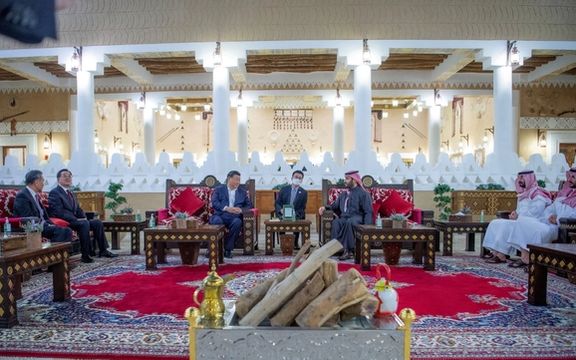
The statement added that despite its occasional support for the Iranian regime, China would never miss a chance to take advantage of Iran's internal crises to expand its trade relations with Tehran's regional rivals. It also accused Moscow of the same sort of opportunism by convincing Tehran to get involved in the Ukraine war by supplying drones to Russia.
The unprecedented criticism of Khamenei's ‘Looking East’ policy by reformists continued with an article in the reformist Etemad newspaper by Esmail Gerami-Moghaddam the deputy leader of the reformist National Trust Party. He wrote that China's stance about the three islands sent a signal to the United States that like Washington, Beijing also believes Tehran’s regional ambitions should be checked.
Gerami-Moghaddam added that China preferred trade deals with Arab countries. "This shows that Tehran's policy of supporting stronger ties with China and its Looking East policy was a serious strategic miscalculation." However, Gerami-Moghaddam stopped short of saying that the architect of that policy was no one other than Khamenei.
Meanwhile, he argued that Iran could support Taiwan's independence and said China should accept to negotiate the fate of Taiwan. Gerami-Moghaddam recalled that since 2005 the Chinese insisted in their meetings with Iranian officials that Tehran should solve its problems with its neighbors and the United States.
In an interview with reformist Sharq daily, Ali Fekri the chairman of the Iranian Organization for Investment and Economic Assistance said that China chose not to invest in Iran and to transfer its capital and investments to other Persian Gulf states. He added that attracting foreign investment is not easy because of US sanctions. He maintained that last year, Russia was the biggest investor in Iran, but did not elaborate on the matter.
Iranian political analyst Ali Bigdeli told Nameh News that China's improving relations with Arab states does not mean that US influence in the region will diminish. Particularly, the US military and security relations with Persian Gulf Arab states is far more extensive to be affected with developments such as China's extended trade presence in the region.
Despite all these justifications, criticism of the Iranian government for over-reliance on China may continue for some time. On Thursday, Moineddin Saeedi, the member of Iranian Parliament from Chabahar in Sistan and Baluchistan Province, said at parliament: "Unlimited trust in China and Russia is sheer stupidity." He also criticized the Iranian government for "not giving the right response to China."
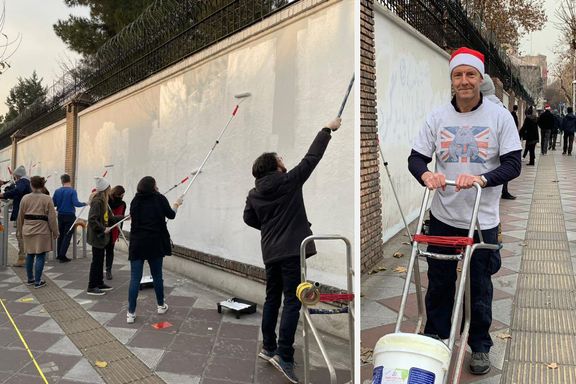
A group Iranians citizen in the capital Tehran have voluntarily helped paint the walls of the British embassy vandalized with anti-UK slogans.
The slogans had been seemingly sprayed by some pro-regime elements to protest UK’s support for anti-government protesters in Iran and condemn the violation of their rights.
Britain summoned Iran's most senior diplomat in London on December 9 to protest the hanging of Mohsen Shekari, the first such execution over ongoing antigovernment unrest.
British envoy to Tehran Simon Shercliff in a tweet on Thursday thanked Iranians and international friends from Germany, South Korea, France, Italy, Brazil and some other countries who sympathized with the UK.
Photos on social media show that Shercliff himself is also helping people to paint the walls.
This is not the first time the UK embassy is vandalized by pro-regime hardliners. In 2011, the embassy was attacked by amob of Basij militia and hardliner activists who ransacked offices and stole documents. One small building was also set on fire during the incident and several people were injured.
It came after the UK strongly supported punitive international sanctions imposed over Iran's nuclear program and in response Iranian parliament voted to downgrade ties with Britain and in effect expel the UK ambassador.
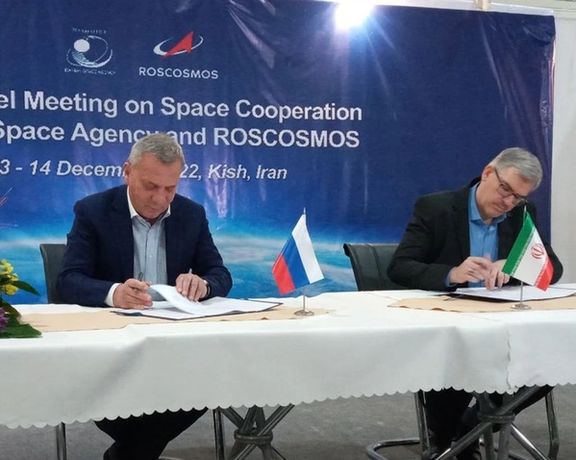
As the world expresses concerns over close military cooperation between Iran and Russia, they have signed a new agreement on cooperation in the space industry.
According to ISNA in Tehran, the two sides have agreed to jointly design and construct remote sensing and telecommunication satellites.
Joint development of infrastructure as well as holding training courses in this regard are among the other details of an agreement revealed on Wednesday.
The document was signed Wednesday by Iran’s head of Space Agency Hassan Salarieh and his Russian counterpart Yury Borisov on the sidelines of an International Aerospace Exhibition in the Kish Island in southern Iran.
Earlier in August, Iran launched a satellite called Khayyam into space from the Baikonur space station in Kazakhstan using Russia's Soyuz satellite carrier rocket.
The UK on Tuesday sanctioned 12 Russian military officials involved in missile strikes on Ukrainian cities as well as some Iranian businessmen involved in the production and supply of military drones used in the attacks.
The EU foreign ministers also lashed out at the Iranian regime Monday for supplying drones to Russia, saying the “weapons provided by Iran are being used indiscriminately by Russia against Ukrainian civilian population and infrastructure causing horrendous destruction and human suffering.”
The bloc sanctioned four people and four entities “for undermining or threatening the territorial integrity, sovereignty and independence of Ukraine.”
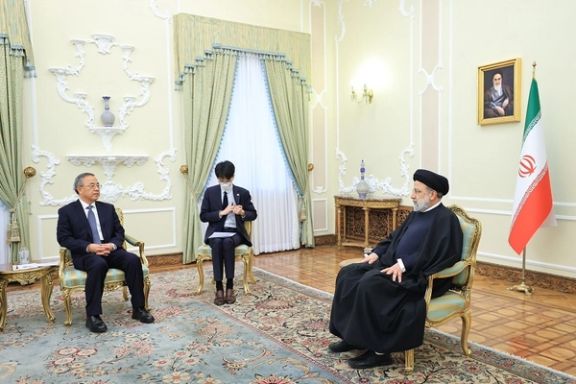
While China has undermined Iran’s territorial integrity by signing a Gulf Cooperation Council statement, Tehran has used a mild tone to express its dissatisfaction.
Iran’s President Ebrahim Raisi on Tuesday told China’s Deputy Prime Minister, Hu Chunhua, that the Islamic Republic is “unhappy” about the position of Beijing and expects its ally to make up for it.
However, he emphasized that the visit of the Chinese delegation to Iran is “important” for the development of mutual economic and commercial cooperation.
In a statement last week during the visit of China’s President Xi Jinping to Saudi Arabia, the Gulf Cooperation Council and the Chinese side made a reference to three small islands in the Persian Gulf that Iran took over as its historic territory in 1971 but the United Arab Emirates claims as its own.
The concluding statement of the meeting that was attended by GCC dignitaries as well as Xi Jinping said: “The leaders affirmed their support for all peaceful efforts, including the initiative and endeavors of the United Arab Emirates to reach a peaceful solution to the issue of the three islands; Greater Tunb, Lesser Tunb, and Abu Musa, through bilateral negotiations in accordance with the rules of international law, and to resolve this issue in accordance with international legitimacy.”
Following the United Kingdom’s withdrawal of its forces from the region to give independence to the small Arab littoral Sheikdoms, Iran’s Mohammad Reza Shah decided to take over the Greater and Lesser Tunbs and Abu Mousa. The UAE was just being formed and there was a serious political and military vacuum on the Arab side of the Persian Gulf.
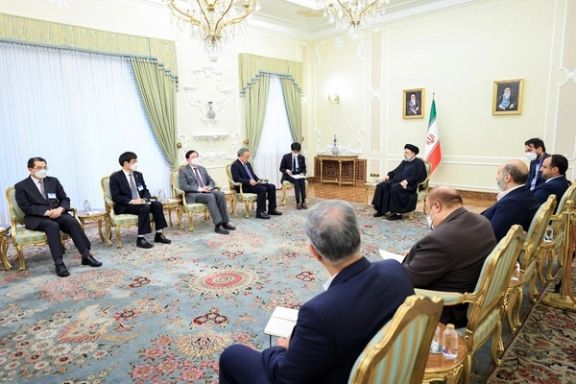
In the wake of China’s stance, many Iranians on social media harshly criticized their government for a major failure. They asked the clerical regime what exactly went wrong that its ally, China acquiesced to such a statement.
Iran’s foreign ministry on Saturday held a meeting with the Chinese envoy to Tehran to express its displeasure about the statement, but unlike the language it uses for Western countries, the foreign ministry did not use the term “summoning” saying the Chinese diplomat was “invited” and refrained from using terms like “protest” or “condemn”.
It said on its website that the envoy “had a visit” with an Iranian official on Saturday, during which Tehran’s “strong dissatisfaction” was expressed.
Regime’s Foreign Minister Hossein Amir-Abdollahian also came under fire after he said in a tweet “the islands are inseparable parts of Iran and are part of the eternal belongings of our motherland. We firmly insist on the need for respecting Iran's territorial integrity.”
Iranians on social media strongly criticized him saying he “did not even dare” to name China, and asking why he has only tweeted in Farsi this time whereas he used to tweet both in Farsi and Chinese to express support for China on Taiwan.
However, it was not the end of the story as China and the Gulf Cooperation Council member states urged for dialogue on Iran’s “destabilizing regional activities” and “support for terrorist and sectarian groups and illegal armed organizations”, as well as its ballistic missiles and drones proliferation.
The statement also emphasized that the peaceful nature of the Iranian nuclear program must be ensured urging the Islamic Republic to fully cooperate with the International Atomic Energy Agency.
Again, Iran’s reaction was so mild when the Foreign Ministry Spokesman Nasser Kanani said it was a “surprise” to see Iran-related clauses in the statement.
Hardliner Kayhan newspaper affiliated with the office of Supreme Leader Ali Khamenei wrote on Sunday, “The expansion of ties between Beijing and Riyadh is more a strategic challenge for the undisputed dominance of the US rather than being a challenge for Iran.” It added that China is entering a region that has always been considered the backyard of Washington.”
The state-run Iran Daily also claimed in its editorial Sunday that China and Russia “have no alternative in their regional policy except Iran” saying relations between Beijing and Arab states “will lead to the realization of the Islamic Republic’s interests.”
However, Nusratullah Tajik, the former ambassador of Iran to Jordan told a website Sunday that “The Chinese have clearly told us they do not agree with our anti-American approaches.”
“We should not rely too much on China as they may use or even misuse Iran's anti-US policy,” he added.